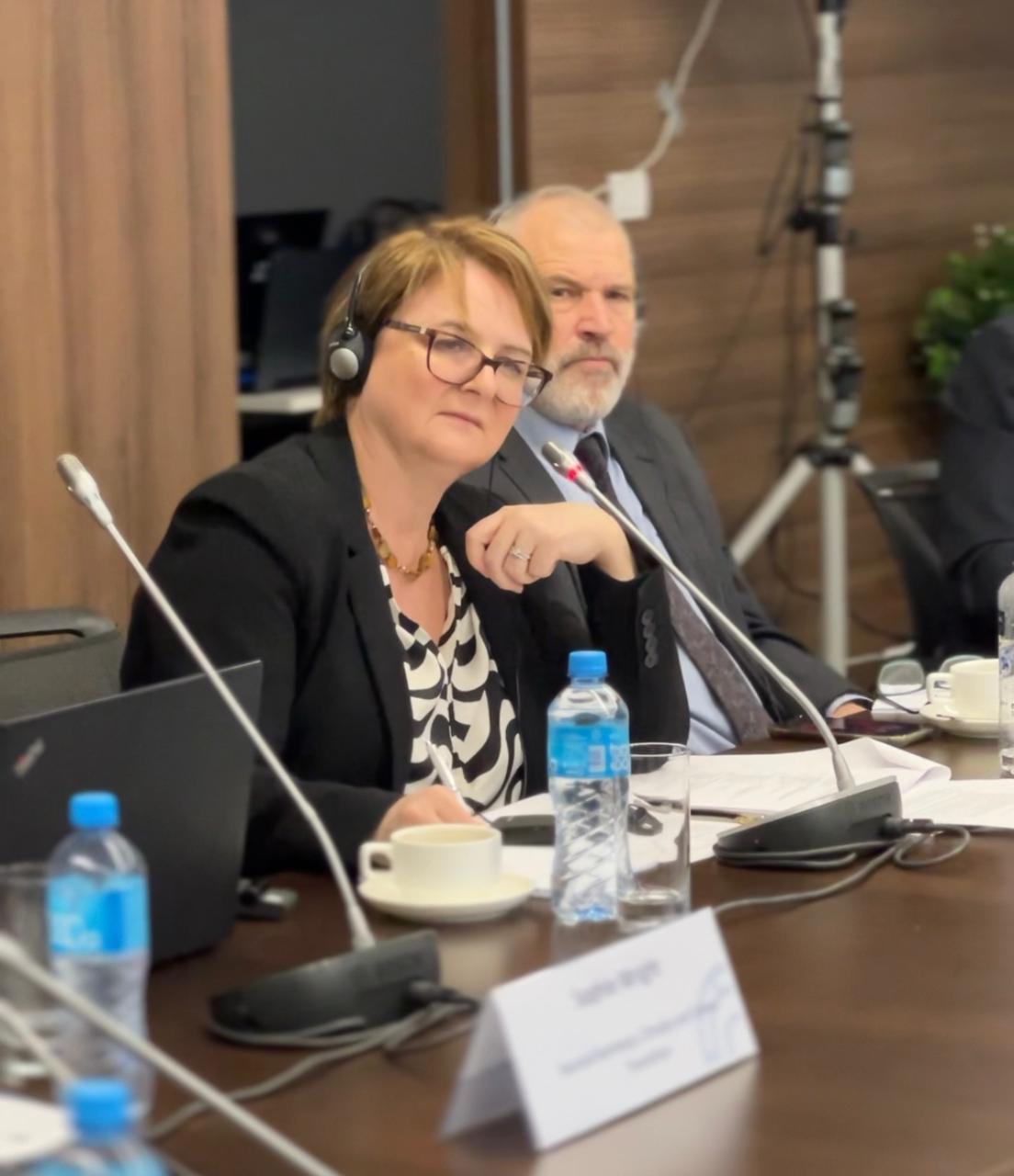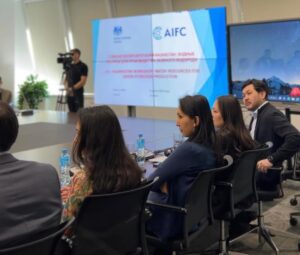ASTANA – The UK-Kazakhstan workshop on water resources for green hydrogen production was held at the Astana International Financial Center on March 9, where UK, Kazakh and international experts were brought together to discuss possible ways for Kazakhstan to meet this challenge.

British Ambassador to Kazakhstan Kathy Leach (C) at the meeting dedicated to the water resources for green hydrogen production in Astana on March 9. Photo credit: The Astana Times.
The event’s agenda included discussions about managing water resources for hydrogen production, water security issues, and UK experience in water management.
It was generally agreed that more data and research were needed around the current and future situation of water resources in Kazakhstan for hydrogen production, particularly in western Kazakhstan.
Participants proposed the creation of a working group of international experts to monitor the Caspian Sea, and advocated for increased cooperation between scientists and Water Basin Councils. Increasing public awareness was also key, and has been important in the ongoing development of a new water code for Kazakhstan. Desalination and wastewater processes were suggested as potential ways to access water for proposed projects in Mangystau, whilst making sure to protect the Caspian Sea.
In her opening remarks, British Ambassador to Kazakhstan Kathy Leach noted that water resources and energy transition issues are essential for Kazakhstan. She said that British experts would share their best practice and knowledge on many topics with Kazakh stakeholders.
The British government is working with Kazakhstan on green hydrogen-related topics. In January, the first UK-Kazakhstan meeting dedicated to low-carbon hydrogen revealed that water resources management for green hydrogen production in Kazakhstan is vital.

The participants of the conference. Photo credit: The Astana Times.
“The event is an opportunity for us to learn more from the Kazakh government, civil society, and academics about the state of water resources in Kazakhstan and their views on the implications of green hydrogen. In addition, it is a key opportunity for us to bring in British experts on water and climate change mapping and discuss potential impacts in relation to hydrogen production,” Sophie Wright, the Second Secretary on Climate and Green Transition of the British Embassy, told The Astana Times.
A number of UK experts presented and participated online in the event, including from academia, industry and water and environment agencies. UK speakers presented online from Newcastle University, the Environment Agency, Water Resources West, Anglian Water and ERG International UK.
International and Kazakh organizations also attended online and in-person. In-person presentations were made by Qazaq Geography and USAID, wider participants included representatives from Kazakh ministries and regional experts from the International Water Management Institute.
Professor Chris Thomas from Lincoln Center for Water and Planetary Health joined the event in person to bring his expertise in water ecosystems and how water interacts with different industrial, agricultural, and ecological biodiversity sectors. He expressed hope for future partnerships with Kazakh colleagues, and learning about the opportunities and challenges of Kazakh water management.
Simon Spooner, an environmental scientist from Global Atkins engineering consultancy, emphasized the importance of hydrogen within holistic energy systems while building and designing infrastructure.
“It is necessary to see how hydrogen fits with the energy supply required to drive green hydrogen production from electricity. Water processing is also required within hydrogen production. There’s a lot of high technology and energy-intensive water processing to create ultra-pure water, which goes into these processes. We have the expertise required for that. We also consider the available resources in quantity, quality, and environmental impacts,” Spooner said.
His company has practical experience being involved in many leading hydrogen production projects.
“We seek to bring this experience to Kazakhstan, too,” he said.
In Spooner’s view the amount of water required for hydrogen production is relatively small and will not change the country’s whole water balance compared to what is used in agriculture.
“What will cause massive water resource problems are the climate change influences, which are going on. Those are by far the biggest risk,” he explained. “Moving towards a hydrogen economy is part of a global move that will slow that. Kazakhstan is a major hydrocarbon economy and a major emitter. So it is necessary to study how to transition the hydrocarbon economy towards using different energy sources and not taking it from fossil fuels. But possibly still using a lot of the same infrastructure, industries, and expertise. To be able to meet everybody’s needs, we probably need that energy. We need the services that we get from it. But we must work out how to change to do that differently.”
It is hoped that this discussion was the first of many about this important topic- global links have been forged and foundations laid for closer collaboration in the future.
